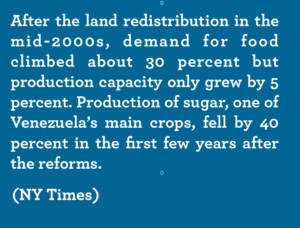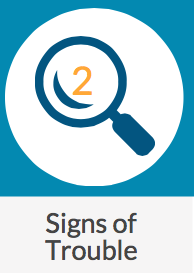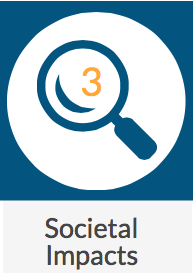Venezuela: Signs of Trouble
By The Policy Circle Team
This is the second in a series of 4 posts taking an in-depth look at Venezuela’s past and present social, political, and economic troubles, the role socialist leaders and their policies played, and how this relates to current conversations within our own government. Understanding the history of such an evolution is an important way to keep similar problems from reaching other shores, including our own.
Click on the icons below to read the posts for this series.
#2: Signs of Trouble
When Hugo Chavez was elected president in 1998, Venezuelans could still remember the IMF-backed austerity measures imposed during the late 1980s and mid 1990s. Chavez identified with the Venezuelans who suffered under these policies, and his campaign promise was to use his power to distribute public and private oil revenues to the poor. By redistributing wealth, Chavez promised to diversify how the economy operated by giving more Venezuelans, especially the poor, more money and more options (CNN).
Many Venezuelans, such as farmers like Ronald and Luis, were initially excited by these prospects when Chavez rose to power. But not all has gone according to plan. Production has been declining in Venezuela for decades. The country’s GDP (Gross Domestic Product), having suffered its third consecutive year of double digit losses in 2018, is now $80 billion – for comparison, neighboring Colombia’s GDP is over $300 billion, and the United States’ is over $19 trillion. Meanwhile, inflation has skyrocketed to over 1 million percent, leaving the currency worthless (WSJ). Unable to buy basic necessities like food and medicine, the average Venezuelan lost over 20 pounds in 2017 and termed the dire situation the “Maduro diet,” referencing then and current President Maduro. The country itself defaulted on billions of dollars of debt (Council on Foreign Relations).
What happened between the start of the Chavez’s reforms and now? How did the hopeful socialist revolution result in the current crisis, and were there warning signs along the way? Venezuela’s situation did not escalate suddenly but was rather the product of years of government policies and economic mismanagement, from government dependence and power shifts away from the private sector to attacks on private property, the media, and political opponents.
Government Dependence and Power Shift Away from Private Sector
Chavez’s Bolivarian Revolution spent government funds on social services and welfare programs, fixed prices, and nationalized farmlands, sometimes even seizing family farms as state property in order to redistribute wealth. These social programs, called “misiones,” delivered basic social services in the areas of education, health, employment, and food (Harvard). There was practically no limit to these welfare programs; one year, the government handouts included approximately 200,000 homes. In 2010, just before parliamentary elections, President Chavez unveiled a joint Iranian-Venezuelan venture that offered deeply discounted cars for citizens (Bloomberg).
The initial results were positive. Between 1999 and 2011, Venezuela’s Gini coefficient (a measure of income inequality) fell from .5 to .39, meaning Venezuela had the “fairest income distribution” in all of Latin America and ranked just ahead of the United States and only behind Canada in the Western Hemisphere. In 2003, poverty levels were reported at 61 percent of the population. By 2013, that was cut down to 34 percent – still higher than the rates of 13.8 percent in Canada and 14.5 percent in the United States, but a significant decrease (Harvard).
What’s the problem?
Instead of relying on an entrepreneurial economy to produce a variety of goods and services to generate wealth, Venezuela’s government made its citizens dependent on one commodity – oil – and the government’s whims on how to distribute the profits. PDVSA, the state-owned oil company, was responsible for these social expenditures. According to one Harvard study, social programs received 23 percent of PDVSA’s direct contributions to the government, and Fonden, the state investment fund that finances infrastructure-related projects and programs for “production, education, health, special circumstances, and public debt,” received 24 percent of PDVSA’s contributions to the government.
Little money remained to reinvest in or maintain the oil industry, but this was not concerning because high oil prices in the mid-2000s allowed Venezuela to import everything it was no longer producing at home. However, using oil revenues for social change continuously deepened the dependence on the resource. Chavez had expanded the state’s control over the oil industry, but “did little to improve how Venezuela actually makes money. He paid no attention to diversifying the economy in domestic production outside of the oil sector” (Vox). Oil prices fell in 2014, shortly after Chavez’s successor Nicolás Maduro assumed the presidency, and oil revenues are no longer enough to keep programs afloat or food and products on supermarket shelves.
Many programs have been cut back, including CLAP boxes, government food handouts. In 2018, one researcher at the University of Venezuela claimed the boxes supplied about half of Venezuelans’ food requirements, but also noted that the boxes dropped from 16 kilograms in January to 11 kilograms in May (Bloomberg). According to a Foreign Affairs interview with government officials in February of 2019, monthly boxes of subsidized rations cost an estimated $400 million per month and are provided to 7 million households, about 90 percent of the population. With the population dependent on government handouts, and government handouts dependent on oil revenues, decline in oil output and prices has left the country with a scarcity of basic necessities.
Attacks on Private Property and Businesses
Chavez’s new economic model was meant to have cooperatives and community enterprises working side-by-side with the private sector, but instead became what was dubbed “21st Century socialism” when the state directly took over. In 2001, a new agricultural law declared land as a public utility and a new hydrocarbons law increased production royalties oil companies needed to pay the government, some by 80 percent. These laws were enacted without any public discussion or participation in the lawmaking process (Harvard).
 The government has since seized millions of acres of farmland, replaced private farms with co-ops, and in 2005 enacted a land reform that eliminated Venezuela’s large estates (BBC). Beyond redistributing land, Chavez began to nationalize most of the country’s private industries and bring them under state control like the oil industry. Starting in 2007, the government bought the largest electricity, telecommunications, and agricultural supplies companies, as well as the nation’s largest steel producer, glass producer, and the three largest cement industries. Chavez even bought Venezuela’s central bank from Spain’s Santander, bringing the financial market under government control (Harvard).
The government has since seized millions of acres of farmland, replaced private farms with co-ops, and in 2005 enacted a land reform that eliminated Venezuela’s large estates (BBC). Beyond redistributing land, Chavez began to nationalize most of the country’s private industries and bring them under state control like the oil industry. Starting in 2007, the government bought the largest electricity, telecommunications, and agricultural supplies companies, as well as the nation’s largest steel producer, glass producer, and the three largest cement industries. Chavez even bought Venezuela’s central bank from Spain’s Santander, bringing the financial market under government control (Harvard).
What’s the problem?
Instead of operating side-by-side, state-owned enterprises began to compete with private enterprises. Private enterprises suffered a number of state-imposed regulations such as complicated and costly export and import permits. Additionally, high taxes on businesses – up to 75 percent for large companies – deteriorated the private sector competition. By 2016, Venezuela’s business environment was ranked the 4th worst country in the world; industrial establishments fell from 12,700 in 1998 to 4,000 in 2016, with commercial establishments closing daily (Harvard).
Multinational corporations started pulling out of the country: A number of international airlines have stopped servicing flights to Venezuela, and businesses including Kimberly Clark, General Motors, Clorox, and Kellogg’s, at risk of having their assets taken by the state, fled the inhospitable economic conditions (Reuters). The Irish packaging company Smurfit Kappa, which operated in Venezuela for 60 years, was forced to stop operations after military officials seized the plants, accusing the company of market speculation and demanding they lower prices (WSJ)
These shutdowns have left thousands of Venezuelans jobless, and the companies that remain only produce just enough to try to cover expenses. Giuseppe Cordivani’s factory on the outskirts of Caracas used to make 300 pairs of shoes a day but now only makes 20; state currency regulations, hyperinflation, and price controls have made it impossible to stock raw materials or pay employees. Private entrepreneurs such as Omar Cedeño, a butcher, have been arrested simply for selling their goods at prices higher than the regulated price, which is necessary to keep shops running. Authorities claim that “private firms are cheating customers with unjustified price rises that are driving inflation.”

The government still dominates what is left of the private sector by subsidizing prices and using oil revenues to fund a government chain of subsidized grocery stores and markets. State-backed food production, however, has not been sufficient. This is because the government nationalized the agricultural supply businesses. All materials from seeds to fertilizer are provided by the government, but farmers report that the government frequently does not deliver. Additionally, inflation has made it almost impossible to afford the cost of importing new machinery, and the government-controlled steel industry is also not producing enough equipment. Because domestic production has plunged, food imports have soared to $7.5 billion, a sixfold increase since Chavez became the president (The Guardian)
Attacks on the Media and on Opposition
As people started to speak up, government oversight of the media was another sign of trouble, and efforts to stop coverage of the opposition have escalated. According to Venezuelan Journalist Carla Angola, besides the government-controlled channels, the only media that reaches Venezuelans is through alternative social media platforms, such as Whatsapp. Media outlets claim the government has threatened them if they cover the opposition; radio stations have been shut town, television channel offices have been raided, and websites have been blocked. One well known radio presenter who ran a daily program for 30 years, César Miguel Rondón, was forced to shut down.
In late February of 2019, Jorge Ramos, a veteran news anchor for Univision News, and his team were detained for over 2 hours at the Miraflores Palace during an interview with Maduro. According to Ramos, Maduro became upset with the questions regarding democracy and the humanitarian crisis, and walked out after 20 minutes. The team was interrogated, placed in a security room, and later released, although their equipment, footage, and phones were confiscated (Univision).
Even international media is experiencing backlash. On March 6, American freelance journalist Cody Weddle, who had been living in Caracas for four years, was taken into custody after an early morning raid on his home by military counterintelligence forces. He was released later that evening and deported. Weddle joins a number of other international journalists who have been detained and deported in the past two months, including journalists from Spain, Colombia, Chile, and France. Venezuelan Foreign Minister Jorge Arreaza claims reporters entered Venezuela without the necessary paperwork; other experts maintain this is not the case and that the police would have needed to authorize the reporters’ visas upon their arrival (Washington Post).
What’s the problem?
Freedom House, an international organization that analyzes challenges to freedom, ranked Venezuela 27th out of the 199 countries and territories included in its 2017 Freedom of the Press report, placing it between Rwanda and the Democratic Republic of the Congo. According to Freedom House, article 57 of Venezuela’s 1999 constitution guarantees freedom of expression and article 51 guarantees the right to access public information, but 2005 reforms to the penal code “expanded the scope of defamation as a criminal offense.” This “Law on Social Responsibility in Radio, Television, and Electronic Media,” bans any content that could “incite or promote hatred,” “disrespect authorities.”
This has translated to a shut down of any protest activity and political opponents. Venezuelan security forces routinely use tear gas and rubber bullets to suppress protesters. In 2016, massive demonstrations involved over 6 million Venezuelans, and Maduro responded by banning street protests, which led to over 130 deaths and almost 5000 arrests (Washington Post). In 2017, United Nations Human Rights officials were not allowed into the country during an investigation of over 120 deaths that could have been related to government forces (Reuters).
Many of these protests have been in response to government attempts to consolidate power, which started after the 2015 elections when the opposition gained a two-thirds majority in Venezuela’s congress, the National Assembly. President Maduro proceeded to strip the congress of its constitutional powers before entirely replacing it with a Constituent Assembly packed with legislators more loyal to Maduro’s regime. By delegitimizing the National Assembly, Maduro was also able to declare the assembly’s Supreme Court appointments illegal, and replaced the Supreme Court with a parallel Supreme Tribunal of Justice, also packed with new magistrates that Maduro trusted (Miami Herald).
Before the May 2018 elections, Maduro banned a number of opposition party candidates from running, and had others imprisoned. Leopoldo López, a high-ranking member of one of Venezuela’s opposition groups, was arrested in 2014 after leading protests against Maduro (The Guardian). After release, Lopez and another opposition leader, Caracas Mayor Antonio Ledezma, were arrested in midnight raids on their homes in 2017. The two remain under house arrest (NPR). Other prominent members of the opposition, including Julio Borges, the former head of the National Assembly, have been living in exile and attempting to mount international support against the Maduro regime.
The Petrostate Example NOT to Follow
Venezuela is not alone. A specific term was created to describe the mess it is in. A petrostate is an “informal term used to describe a country with several interrelated attributes,” including:
-
- Government income that is heavily reliant on exporting oil or natural gas
- An elite minority that possesses most of the economic and political power
- Weak political institutions compounded by corruption
Other notable petrostates include Algeria, Iran, Cameroon, Chad, and Libya (Council on Foreign Relations).
Given its failure to diversify the economy and its reliance on oil; the government control and oversight of industry that prevented entrepreneurship from flourishing; and the attempts to shutdown any kind of opposition, Venezuela has found itself in the dangerous position of a petrostate.
The clear signs of trouble came from a charismatic leader who promised the nation that government was a solution to their woes, and made the country dependent on one resource while shutting down competition and diversity of opinion and debate. While it might seem strange that such a chain of events could happen without notice, the slow dissolution of democracy often happens while many blindly laud the intermediary steps. In the midst of media shutdowns and opposition intimidation in 2011, for example, Senator Bernie Sanders held up Venezuela as an example due its low rate of income inequality. It is important for all of us to take note of the early phases of Venezuela’s destructive path because, as you’ll read in the next post, it’s the regular Venezuelans trying to live day-to-day that have been hit the hardest.
The third post, “Societal Impacts: Venezuela’s Crisis Situation” is also available.
The Policy Circle is a 501(c)3 that provides a fact-based, nonpartisan framework built to inspire women living in the same community to connect, learn about and discuss economic policies that impact their lives. Women across the nation are taking a leadership role in the public policy dialogue on what human creativity can accomplish in an open economy.



